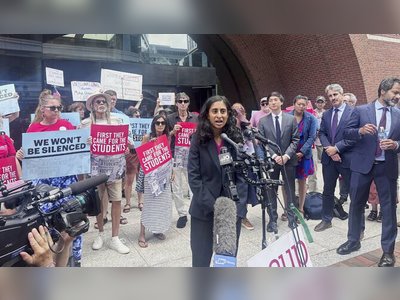
Harvard University Challenges Federal Funding Cuts in Landmark Court Case
In a pivotal court hearing, Harvard University defends its research grants against federal funding cuts, sparking a debate over academic freedom and government control.
In a significant showdown between academia and the federal government, Harvard University has argued before a US District Judge that $2.6 billion in funding cuts imposed by the Trump administration are unlawful.
The case, being closely watched across higher education, centers on the government's assertion that Harvard failed to adequately address antisemitism, a claim the university strongly refutes.The litigation stems from the Trump administration's ongoing pressure on Harvard, which it accuses of fostering an environment hostile to Jewish students and faculty.
In response, the administration has sought to impose sweeping changes on the Ivy League institution, including the auditing of viewpoints among students and faculty, and adjustments in admissions and hiring practices.Harvard maintains that such demands encroach upon its autonomy and academic freedom, emphasizing that 'it is about the government's conduct toward Harvard.' The university further argues that it has taken concrete steps to combat antisemitism, a claim supported by numerous alumni who rallied in solidarity, holding signs such as 'Hands Off Harvard' to express their opposition to the funding cuts.During the hearing, Judge Allison Burroughs questioned the basis for the government's findings on antisemitism, describing some of the assertions as 'mind-boggling.' She scrutinized how the administration could make ad-hoc decisions to cancel grants without providing evidence that any research was antisemitic.
The legal battle over these funding cuts represents a critical test for academic freedom and the limits of governmental oversight in higher education.The case is further complicated by the broader political context, with President Trump directly weighing in on social media, criticizing Judge Burroughs and accusing Harvard of being anti-Semitic and anti-American.
This personal involvement has added an unprecedented layer to the dispute, which could have far-reaching implications for the future of federal funding for universities and their research endeavors.
The case, being closely watched across higher education, centers on the government's assertion that Harvard failed to adequately address antisemitism, a claim the university strongly refutes.The litigation stems from the Trump administration's ongoing pressure on Harvard, which it accuses of fostering an environment hostile to Jewish students and faculty.
In response, the administration has sought to impose sweeping changes on the Ivy League institution, including the auditing of viewpoints among students and faculty, and adjustments in admissions and hiring practices.Harvard maintains that such demands encroach upon its autonomy and academic freedom, emphasizing that 'it is about the government's conduct toward Harvard.' The university further argues that it has taken concrete steps to combat antisemitism, a claim supported by numerous alumni who rallied in solidarity, holding signs such as 'Hands Off Harvard' to express their opposition to the funding cuts.During the hearing, Judge Allison Burroughs questioned the basis for the government's findings on antisemitism, describing some of the assertions as 'mind-boggling.' She scrutinized how the administration could make ad-hoc decisions to cancel grants without providing evidence that any research was antisemitic.
The legal battle over these funding cuts represents a critical test for academic freedom and the limits of governmental oversight in higher education.The case is further complicated by the broader political context, with President Trump directly weighing in on social media, criticizing Judge Burroughs and accusing Harvard of being anti-Semitic and anti-American.
This personal involvement has added an unprecedented layer to the dispute, which could have far-reaching implications for the future of federal funding for universities and their research endeavors.










